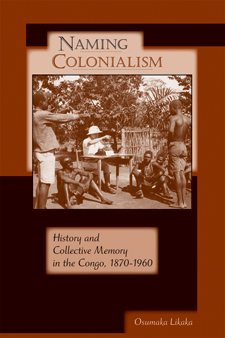|
Naming Colonialism
History and Collective Memory in the Congo,
1870—1960
Osumaka Likaka
Africa and the Diaspora:
History, Politics, Culture
Thomas Spear, David Henige, and Michael Schatzberg, Series Editors
Matcho Kali: "Angry Eyes." Simba Bulaya: "Europe's Lion."—African names for European colonizers
What's in a name? As Osumaka Likaka argues in this illuminating study, the names that Congolese villagers gave to European colonizers reveal much about how Africans experienced and reacted to colonialism. The arrival of explorers, missionaries, administrators, and company agents allowed Africans to observe Westerners' physical appearances, behavior, and cultural practices at close range—often resulting in subtle yet trenchant critiques. By naming Europeans, Africans turned a universal practice into a local mnemonic system, recording and preserving the village's understanding of colonialism in the form of pithy verbal expressions that were easy to remember and transmit across localities, regions, and generations.
Methodologically innovative, Naming Colonialism advances a new approach that shows how a cultural process—the naming of Europeans—can provide a point of entry into economic and social histories. Drawing on archival documents and oral interviews, Likaka encounters and analyzes a welter of coded fragments. The vivid epithets Congolese gave to rubber company agents—"the home burner," "Leopard," "Beat, beat," "The hippopotamus-hide whip"—clearly conveyed the violence that underpinned colonial extractive economies. Other names were subtler, hinting at derogatory meaning by way of riddles, metaphors, or symbols to which the Europeans were oblivious. Africans thus emerge from this study as autonomous actors whose capacity to observe, categorize, and evaluate reverses our usual optic, providing a critical window on central African colonialism in its local and regional dimensions.
"This innovative work offers rare access to African perceptions and interpretations of colonialism. Based on thorough research and creative analysis, Likaka's book will have widespread scholarly and classroom appeal."—Thomas Spear, series editor and professor emeritus of African history at the University of Wisconsin—Madison
Osumaka Likaka is associate professor of history at Wayne State
University. He is author of Rural Society and Cotton in Colonial Zaire, also published by the University of Wisconsin Press.
Media & bookseller inquiries regarding review copies, events, and interviews can be directed to the publicity department at publicity@wwwtest.uwpress.wisc.edu or (608) 263-0734. (If you want to examine a book for possible course use, please see our Course Books page. If you want to examine a book for possible rights licensing, please see Rights & Permissions.) |
|

December 2009
LC: 2009008138 DT
216 pp. 6 x 9
3 b/w illus., 2 maps
“Osumaka Likaka’s book is methodologically significant. . . .his focus on naming provides a wonderfully effective device for delving into local experiences. His book tells a unique story about grassroots perceptions and community memory, in fluent and moving prose.”
—Diana Jeater, The American Historical Review
|
